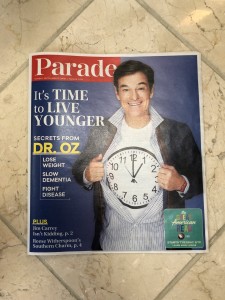 I’ve recently done a couple of posts about eating and eating disorders. If you haven’t read them, here they are:
I’ve recently done a couple of posts about eating and eating disorders. If you haven’t read them, here they are:
And a little more background, from 2015:
Eat, Drink, Repeat: Day 1 of a 3-Day Binge
I’m back again today with something I read this week from the September 9 issue of Parade Magazine:
“Secrets From Dr Oz: Why He’s Fasting and Using the Clock to Slow Dementia and Fight Disease.”
For those who are already embracing the “intuitive eating” approach, this might not appeal to you, since that program de-emphasizes a focus on weight loss. But I like that Dr. Oz is talking about weight loss, dementia, and other diseases in this piece. And it’s all about TIME:
“New studies suggest that WHEN you eat matters for your health, longevity and even weight loss,” Oz says. . . . Before drive-thrus, microwaves and refrigerators, the human body evolved to go for long stretches without food. During these breaks, vital things happen. Insulin levels drop which makes stored body fat more accessible for us. Human growth hormone goes up, to help burn fat and build muscle. Damaged cell material is shed faster. All this may help us to:
Lose weight (or stick to a healthy weight.)
Slow Alzheimer’s.
Grow a healthier gut.
For more details about each of these, read the article here. (There’s also a short video with Dr. Oz included in the link.)
I was encouraged by his discussion of “intermittent fasting” because this is something that I had already embraced, with some degree of success with weight loss as a result. He promotes sleeping 8 hours (which I often do) and then fasting for 4 hours–preferably two of those before going to bed, which I also have embraced to help with my GERD (gastro-enterstinal reflux disease). I actually do better with a longer fasting time, like from 6 p.m. to 8 a.m., but most night we don’t have supper until around 7. When I’m being more focused on dieting, I often have my “supper” in the middle of the afternoon and then feed my husband at 7, after he exercises after work. When I do that, I find I lose weight and feel better. But it’s hard not to snack around 8-10 p.m., which can undo the benefits of eating earlier! If I snack after 9 p.m. I often don’t eat the next day until mid morning or even noon.
Of course this doesn’t “cure” my eating disorder (I’m struggling to give up Hershey’s kisses because I can’t seem to moderate them) but I’m healthier today, weighing almost 20 pounds less than I did three years ago, and I really want to keep going to get to an even healthier weight.
Anyway, I thought I’d share the link to this article for those who are interested. To continue the discussion about various approaches to dieting (or not dieting) please leave a comment here or on the Facebook thread. Thanks, always, for reading!